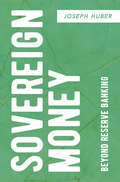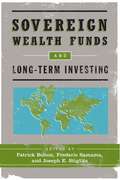- Table View
- List View
Sovereign Debt and Credit Rating Bias
by David F. Tennant Marlon R. TraceySovereign Debt and Credit Rating Bias.
Sovereign Debt and International Financial Control: The Middle East and the Balkans, 1870-1914
by Ali Coşkun TunçerSovereign Debt and International Financial Control.
Sovereign Debt and International Financial Control: The Middle East and the Balkans, 1870–1914 (Palgrave Studies in the History of Finance)
by Ali Co?kun TunçerThis book revisits an important chapter of financial history in the Middle East and the Balkans from 1870 1914. During this period, capital flows in the form of sovereign debt increased rapidly throughout the region. The spiral of heavy government borrowing eventually culminated in defaults on foreign obligations in the Ottoman Empire (1875), Egypt (1876), Greece (1893) and Serbia (1895). In all four cases, introducing international financial control over the finances of the debtor states became the prevalent form of dealing with defaults. The different cases of international financial control became increasingly refined and they marked important milestones in the evolution of the global governance of sovereign debt before 1914. For the defaulting states however, the immediate impact of international financial control was infringement of sovereignty. The extent of international financial control and the borrowing capacity of debtor states varied in each case as well as the degree of resistance towards it. This book documents the characteristics of international financial control in a comparative perspective. It relates sovereign debt, default and international financial control to political and fiscal systems, and raises questions about the tension between national sovereignty and global capital. It sheds light on the impact of international financial control on the long-term credibility and fiscal capacity of the debtor states in question. The author demonstrates that the governments' decisions to borrow internationally, and their attitudes towards international financial control, were heavily influenced by domestic political and fiscal factors.
Sovereign Debt and Rating Agency Bias
by D. Tennant M. TraceySovereign Debt and Credit Rating Bias rejects the notion that credit rating agencies' rigorous and transparent determination of ratings leaves no room for bias, and debunks the myth that the value CRAs place on their reputational capital precludes prolonged biases. To determine the extent of CRAs' biased actions, Tennant and Tracey apply a rigorous methodology to a well-established economic model of the determinants of sovereign debt quality. They present strong evidence of bias against poor countries and demonstrate how biased rating changes could disadvantage such countries and the companies operating therein as they seek access to international capital markets. They discuss plausible explanations for the bias and suggest remedial measures that would help ensure balance in credit rating changes. This book fills an important gap by rigorously examining a long-standing but often ignored concern about the rating practices of credit rating agencies.
Sovereign Debt and the Financial Crisis
by Carlos A. Primo Braga Gallina A. VinceletteIn the wake of the financial crisis of 2008, governments worldwide undertook massive fiscal interventions to stave off what otherwise would have likely been a system-wide financial and economic meltdown. The policy responses engendered significant shifts in growth trajectories and debt sustainability outlooks of both mature and developing economies. The magnitude of public liabilities incurred and the uncertainty surrounding the exit from unprecedented discretionary fiscal stimulus have become a major source of concern about a future crisis. Will the current stringent financial conditions lead to a wave of sovereign debt problems around the world? Or will countries, given their stronger fundamentals compared with previous crises' episodes, successfully muddle through the crisis? The book presents and discusses policy-relevant research on the current debt challenges which developing, emerging market, and developed economies face. Its value added lies in the integrated approach of drawing on theoretical research and evidence from practitioners' experience in developing, emerging market, and developed countries.
Sovereign Debt: From Safety to Default (Robert W. Kolb Series #605)
by Robert W. KolbAn intelligent analysis of the dangers, opportunities, and consequences of global sovereign debt Sovereign debt is growing internationally at a terrifying rate, as nations seek to prop up their collapsing economies. One only needs to look at the sovereign risk pressures faced by Greece, Spain, and Ireland to get an idea of how big this problem has become. Understanding this dilemma is now more important than ever, that's why Robert Kolb has compiled Sovereign Debt. With this book as your guide, you'll gain a better perspective on the essential issues surrounding sovereign debt and default through discussions of national defaults, systemic risk, associated costs, and much more. Historical studies are also included to provide a realistic framework of reference. Contains up-to-date research and analysis on sovereign debt from today's leading practitioners and academics Details the dangers of defaults and their associated systemic risks Explores the past, present, and future of sovereign debt The repercussions of a national default are all-encompassing as global markets are intricately interwoven in the modern world. Sovereign Debt examines what it will take to overcome the challenges of this market and how you can deal with the uncertainty surrounding it.
Sovereign Default, Private Sector Creditors and the IFIs
by Emine BozA report from the International Monetary Fund.
Sovereign Defaults before International Courts and Tribunals
by Michael WaibelInternational law on sovereign defaults is underdeveloped because States have largely refrained from adjudicating disputes arising out of public debt. The looming new wave of sovereign defaults is likely to shift dispute resolution away from national courts to international tribunals and transform the current regime for restructuring sovereign debt. Michael Waibel assesses how international tribunals balance creditor claims and sovereign capacity to pay across time. The history of adjudicating sovereign defaults internationally over the last 150 years offers a rich repository of experience for future cases: US state defaults, quasi-receiverships in the Dominican Republic and Ottoman Empire, the Venezuela Preferential Case, the Soviet repudiation in 1917, the League of Nations, the World War Foreign Debt Commission, Germany's 30-year restructuring after 1918 and ICSID arbitration on Argentina's default in 2001. The remarkable continuity in international practice and jurisprudence suggests avenues for building durable institutions capable of resolving future sovereign defaults.
Sovereign Funds: How the Communist Party of China Finances Its Global Ambitions
by Zongyuan Zoe LiuThe first in-depth account of the sudden growth of China’s sovereign wealth funds and their transformative impact on global markets, domestic and multinational businesses, and international politics.One of the keys to China’s global rise has been its strategy of deploying sovereign wealth on behalf of state power. Since President Xi Jinping took office in 2013, China has doubled down on financial statecraft, making shrewd investments with the sovereign funds it has built up by leveraging its foreign exchange reserves. Sovereign Funds tells the story of how the Communist Party of China (CPC) became a global financier of surpassing ambition.Zongyuan Zoe Liu offers a comprehensive and up-to-date analysis of the evolution of China’s sovereign funds, including the China Investment Corporation, the State Administration of Foreign Exchange, and Central Huijin Investment. Liu shows how these institutions have become mechanisms not only for transforming low-reward foreign exchange reserves into investment capital but also for power projection. Sovereign funds are essential drivers of the national interest, shaping global markets, advancing the historic Belt and Road Initiative, and funneling state assets into strategic industries such as semiconductors, fintech, and artificial intelligence. In the era of President Xi, state-owned financial institutions have become gatekeepers of the Chinese economy. Political and personal relationships with prestigious sovereign funds have enabled Blackstone to flourish in China and have fueled the ascendance of private tech giants such as Alibaba, Ant Finance, and Didi.As Liu makes clear, sovereign funds are not just for oil exporters. The CPC is a leader in both foreign exchange reserves investment and economic statecraft, using state capital to encourage domestic economic activity and create spheres of influence worldwide.
Sovereign Money
by Joseph HuberIn coming to terms with the still smoldering financial crisis, little attention has been paid to the flaws within our monetary system and how these flaws lie at the root of the crisis. This book provides an introduction and critical assessment of the current monetary system. It begins with an up to date account of the workings of today's system of state-backed 'bankmoney', illustrating the various forms and issuers of money, and discussing money theory and fallacy past and present. It also looks at related economic challenges such as inflation and deflation, asset inflation and bubble building that lead to market instability and examines the ineffectual monetary policies and primary credit markets that are failing to reach some sort of self-limiting equilibrium. In order to fix our financial system, we first need to understand its limitations and the flaws in current monetary and regulatory policy and then correct them. The concluding part of this book is dedicated to the latter, advocating a move towards the sovereign monetary prerogatives of issuing the entire stock of official money and benefitting from the gain thereof (seigniorage). The author argues that these functions should be made the sole responsibility of independent and impartial central banks with full control over the stock of money (not the uses of money) on the basis of a legal mandate that would be more detailed than is the case today. This includes a thorough separation of monetary and fiscal powers, and of both from banking and wider financing functions. This book provides a welcome addition to the banking literature, guiding readers through the inner workings of our monetary and regulatory environments and proposing a new way forward that will better protect our economy from financial instability and crisis.
Sovereign Money: Beyond Reserve Banking
by Joseph HuberIn coming to terms with the still smoldering financial crisis, little attention has been paid to the flaws within our monetary system and how these flaws lie at the root of the crisis.This book provides an introduction and critical assessment of the current monetary system. It begins with an up to date account of the workings of today’s system of state-backed ‘bankmoney’, illustrating the various forms and issuers of money, and discussing money theory and fallacy past and present. It also looks at related economic challenges such as inflation and deflation, asset inflation and bubble building that lead to market instability and examines the ineffectual monetary policies and primary credit markets that are failing to reach some sort of self-limiting equilibrium.In order to fix our financial system, we first need to understand its limitations and the flaws in current monetary and regulatory policy and then correct them. The concluding part of this book is dedicated to the latter, advocating a move towards the sovereign monetary prerogatives of issuing the entire stock of official money and benefitting from the gain thereof (seigniorage). The author argues that these functions should be made the sole responsibility of independent and impartial central banks with full control over the stock of money (not the uses of money) on the basis of a legal mandate that would be more detailed than is the case today. This includes a thorough separation of monetary and fiscal powers, and of both from banking and wider financing functions.This book provides a welcome addition to the banking literature, guiding readers through the inner workings of our monetary and regulatory environments and proposing a new way forward that will better protect our economy from financial instability and crisis.
Sovereign Risk Analysis (Routledge Library Editions: Banking & Finance)
by Shelagh HeffernanDirected both at students of international finance and practitioners in the field, the book stresses the importance of treating the analysis of sovereign risk in a more general framework than is typically the case, identifying the components of both the demand and supply of sovereign loans. The author also discusses the link between the unique aspects of sovereign lending, the interdependence of the international banking system and the potential instability in the world financial system.
Sovereign Risk And Public-private Partnership During The Euro Crisis
by Gianluca Oricchio Maura Campra Eugenio Mario Braja Paolo EspositoThis book is an examination of the sovereign risk and debt limit issues facing the Eurozone (crisis/post crisis) and the need for alternative mechanisms to fund the capital investment requirements of the region.
Sovereign Risk and Financial Crisis: The International Political Economy of the Eurozone (International Political Economy Series)
by Silvia PepinoThis book provides an original and timely insight into the role that the domestic and international political economy played in the Eurozone sovereign debt crisis, combining an innovative theoretical framework with in-depth bond market analysis.
Sovereign Risk and Financial Crisis: The International Political Economy of the Eurozone (International Political Economy Series)
by Silvia PepinoThis book provides an original and timely insight into the role that the domestic and international political economy played in the Eurozone sovereign debt crisis, combining an innovative theoretical framework with in-depth bond market analysis.
Sovereign Wealth Funds and International Political Economy (Global Finance Ser.)
by Manda ShemiraniFor the first time, Shemirani provides a systematic methodology for the study of Sovereign Wealth Funds (SWFs) over their life span and emphasizes the need for a paradigm shift in our approach towards the study of state capitalism. Applied in this book to the world's four largest SWFs - Government Pension Fund-Global of Norway, Abu Dhabi Investment Authority of the United Arab Emirates, Temasek of Singapore, and the National Wealth Fund of the Russian Federation, this methodology can also be applied to other funds or form a basis for further analytical studies of SWFs. In addition to its first hand approach, the book addresses concerns about the lack of transparency by offering insights into the functioning and investment strategies of the selected SWFs. Academics and students in international political economy, international finance and international business as well as financiers, business leaders, and policy makers, will find the subject and the approach of this book highly useful.
Sovereign Wealth Funds and Long-Term Investing: A New Form Of Capitalism?
by Joseph E. Stiglitz Patrick Bolton Frederic SamamaSovereign wealth funds (SWFs) are state-owned investment funds with combined asset holdings that are fast approaching four trillion dollars. Recently emerging as a major force in global financial markets, SWFs have other distinctive features besides their state-owned status: they are mainly located in developing countries and are intimately tied to energy and commodities exports, and they carry virtually no liabilities and have little redemption risk, which allows them to take a longer-term investment outlook than most other institutional investors. Edited by a Nobel laureate, a respected academic at the Columbia Business School, and a longtime international banker and asset manager, this volume examines the specificities of SWFs in greater detail and discusses the implications of their growing presence for the world economy. Based on essays delivered in 2011 at a major conference on SWFs held at Columbia University, this volume discusses the objectives and performance of SWFs, as well as their benchmarks and governance. What are the opportunities for SWFs as long-term investments? How do they fulfill their socially responsible mission? And what role can SWFs play in fostering sustainable development and greater global financial stability? These are some of the crucial questions addressed in this one-of-a-kind volume.
Sovereign Wealth Funds in Resource Economies: Institutional and Fiscal Foundations
by Malan Rietveld Khalid AlsweilemSovereign wealth funds (SWFs) have reached a transitional moment. Created as a way to direct excess wealth toward economic development and long-term financial returns, some countries are now seeing a decline in revenue from sources such as oil. Many SWFs are now facing a new challenge—how to spend sustainably without depleting the funds. Sovereign Wealth Funds in Resource Economies explains the fiscal rules and institutional structures that can make SWFs thrive, providing a practical and theoretical guide to their optimal use in resource-revenue management.Khalid Alsweilem and Malan Rietveld put forward an institutional perspective of SWFs as quasi-independent political and economic entities charged with managing national resource wealth, examining both investment and disbursement strategies. They advance a systematic, rule-based approach, suggesting when to accumulate and when to begin countercyclical spending based on concrete case studies. More than a mere financial portfolio, SWFs must be embedded in a credible fiscal and institutional framework if they are to contribute to improved economic performance. Alsweilem and Rietveld consider the variety of relationships that exist between SWFs and their governments, exploring the legal and policy side of the institutional approach. Their rule-based description of SWFs, since it allows tailoring and adjustment and invokes rules of thumb and best practices, is intended to be widely applicable across the diverse spectrum of global SWFs. Bringing together the practitioner perspective and scholarly expertise, this book will be invaluable for global policy makers and scholars working with sovereign wealth funds.
Sovereign Wealth Funds, Local Content Policies and CSR: Developments in the Extractives Sector (CSR, Sustainability, Ethics & Governance)
by Jonathon W. Moses Rochelle Spencer Eduardo G. PereiraThis book explores three particular strategies in the extractives sector for creating shared wealth, increased labour opportunities and positive social, environmental and economic outcomes from corporate projects, namely: state wealth funds (SWF), local content policies (LCP) and corporate social responsibility (CSR) practices. Collectively, the chapters explore the associated experiences and challenges in different parts of the world with the view to inform equitable and sustainable development for the communities living adjacent to extractives sites and the wider society and environment. Examples of LCPs, SWFs and CSR practices from 12 jurisdictions with diverse experiences offer usefull insights. The book illuminates challenges and opportunities for sustainable development outcomes of the extractives sector. It reflects the need to take on board the lessons of these global experiences in order to improve outcomes for poverty reduction, inequality reduction and sustainable development.
Sovereign Wealth Funds: Legitimacy, Governance, and Global Power
by Gordon L. Clark Adam D. Dixon Ashby H.B. MonkThe worldwide rise of sovereign wealth funds is emblematic of the ongoing transformation of nation-state economic prospects. Sovereign Wealth Funds maps the global footprints of these financial institutions, examining their governance and investment management, and issues of domestic and international legitimacy. Through a variety of case studies--from the China Investment Corporation to the funds of several Gulf states--the authors show that the forces propelling the adoption and development of sovereign wealth funds vary by country. The authors also show that many of these investment institutions have identifiable commonalities of form and function that match the core institutions of Western financial markets. The authors suggest that the international legitimacy of sovereign wealth funds is based on the degree to which their design and governance match Western expectations about investment management. Undercutting commonplace assumptions about the emerging world of the twenty-first century, the authors demonstrate that even small countries with large and globally oriented sovereign wealth funds are likely to play a significant role in international relations. Sovereign Wealth Funds considers how such financial organizations have altered not only the face of finance, but also the international geopolitical landscape.
Sovereign of the Market: The Money Question in Early America
by Jeffrey SklanskyWhat should serve as money, who should control its creation and circulation, and according to what rules? For more than two hundred years, the “money question” shaped American social thought, becoming a central subject of political debate and class conflict. Sovereign of the Market reveals how and why this happened. Jeffrey Sklansky’s wide-ranging study comprises three chronological parts devoted to major episodes in the career of the money question. First, the fight over the innovation of paper money in colonial New England. Second, the battle over the development of commercial banking in the new United States. And third, the struggle over the national banking system and the international gold standard in the late nineteenth century. Each section explores a broader problem of power that framed each conflict in successive phases of capitalist development: circulation, representation, and association. The three parts also encompass intellectual biographies of opposing reformers for each period, shedding new light on the connections between economic thought and other aspects of early American culture. The result is a fascinating, insightful, and deeply considered contribution to the history of capitalism.
Sovereignty and Land Rights of Indigenous Peoples in the United States
by Wayne EdwardsThis book presents a comparative study of the land settlements and sovereign arrangements between the US government and the three major aggregated groups of indigenous peoples—American Indians, Native Alaskans, and Native Hawaiians—whose land rights claims have resulted in very different outcomes. It shows that the outcomes of their sovereign claims were different, though their bases were similar. While the US government insists that it is committed to the government-to-government relationship it has with the tribes, federal authority severely limits the ability of tribal governments to participate as an equal partner.
Sovereignty for Survival
by James Robert Allison IIIIn the years following World War II many multi-national energy firms, bolstered by outdated U. S. federal laws, turned their attention to the abundant resources buried beneath Native American reservations. By the 1970s, however, a coalition of Native Americans in the Northern Plains had successfully blocked the efforts of powerful energy corporations to develop coal reserves on sovereign Indian land. This challenge to corporate and federal authorities, initiated by the Crow and Northern Cheyenne nations, changed the laws of the land to expand Native American sovereignty while simultaneously reshaping Native identities and Indian Country itself. James Allison makes an important contribution to ethnic, environmental, and energy studies with this unique exploration of the influence of America's indigenous peoples on energy policy and development. Allison's fascinating history documents how certain federally supported, often environmentally damaging, energy projects were perceived by American Indians as potentially disruptive to indigenous lifeways. These perceived threats sparked a pan-tribal resistance movement that ultimately increased Native American autonomy over reservation lands and enabled an unprecedented boom in tribal entrepreneurship. At the same time, the author demonstrates how this movement generated great controversy within Native American communities, inspiring intense debates over culturally authentic forms of indigenous governance and the proper management of tribal lands.
Sovereignty without Power: Liberia in the Age of Empires, 1822–1980 (Cambridge Studies in Economic History - Second Series)
by Leigh A. GardnerWhat did independence mean during the age of empires? How did independent governments balance different interests when they made policies about trade, money and access to foreign capital? Sovereignty without Power tells the story of Liberia, one of the few African countries to maintain independence through the colonial period. Established in 1822 as a colony for freed slaves from the United States, Liberia's history illustrates how the government's efforts to exercise its economic sovereignty and engage with the global economy shaped Liberia's economic and political development over the nineteenth and twentieth centuries. Drawing together a wide range of archival sources, Leigh A. Gardner presents the first quantitative estimates of Liberian's economic performance and uses these to compare it to its colonized neighbors and other independent countries. Liberia's history anticipated challenges still faced by developing countries today, and offers a new perspective on the role of power and power relationships in shaping Africa's economic history.






















